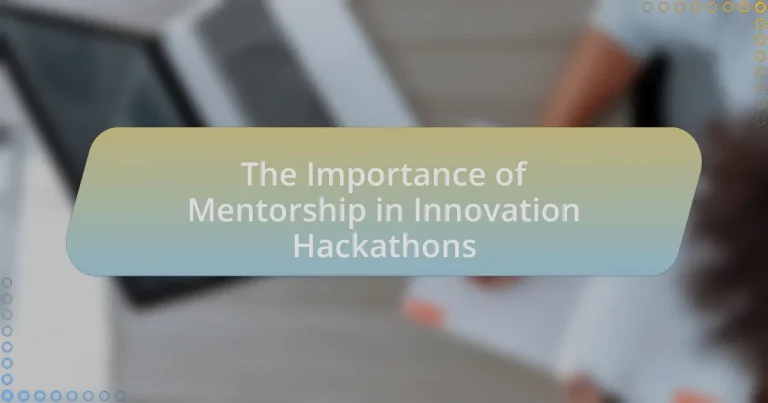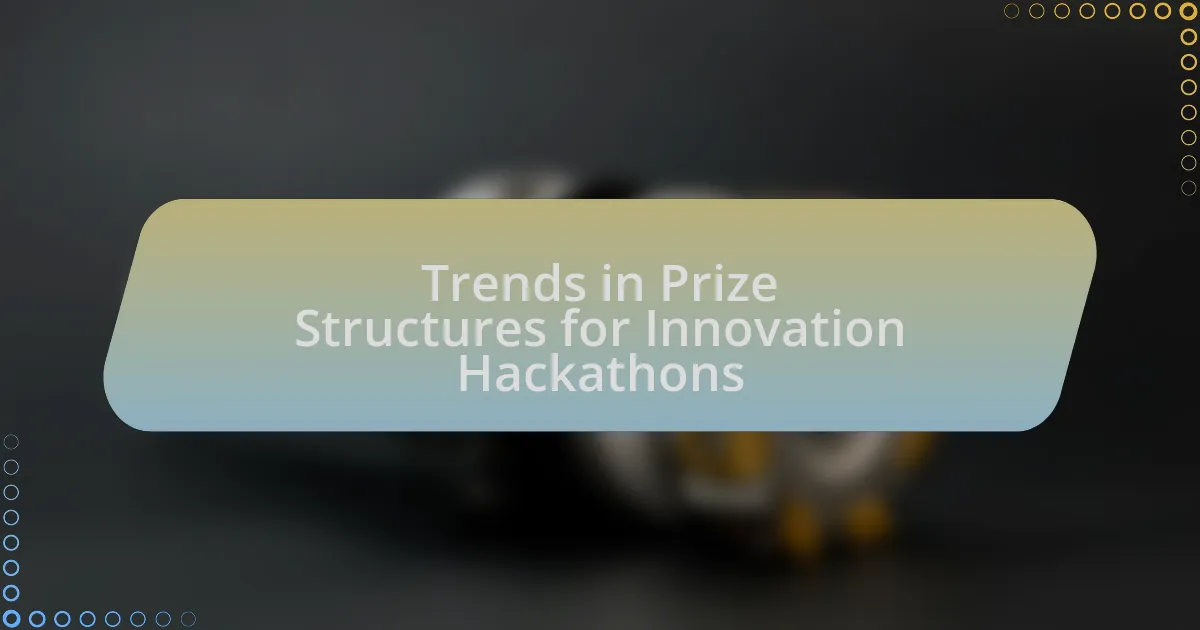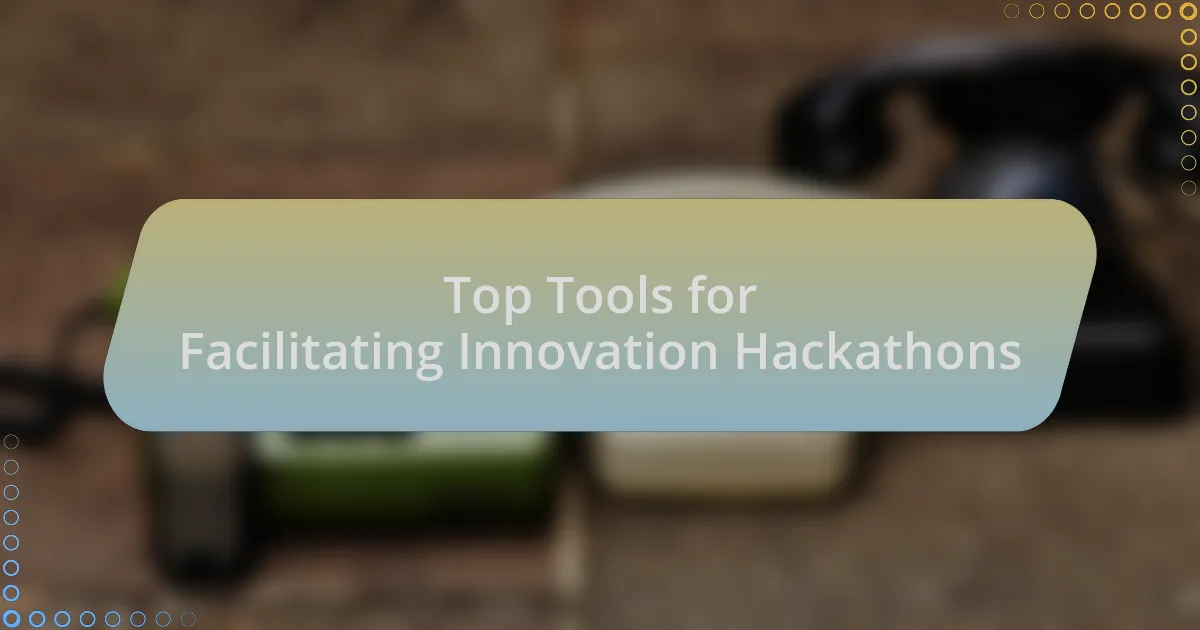The article focuses on the critical role of mentorship in innovation hackathons, highlighting how mentors enhance participant engagement, project quality, and team dynamics. It discusses various types of mentorship, including technical, business, and peer mentorship, and examines the specific skills mentors provide, such as problem-solving and communication. The article also addresses the impact of mentorship on innovation outcomes, emphasizing the importance of effective mentor-mentee matching and strategies for overcoming challenges in hackathon environments. Key takeaways for successful mentorship practices are outlined, including the need for clear communication, active engagement, and tailored guidance to maximize participant success.
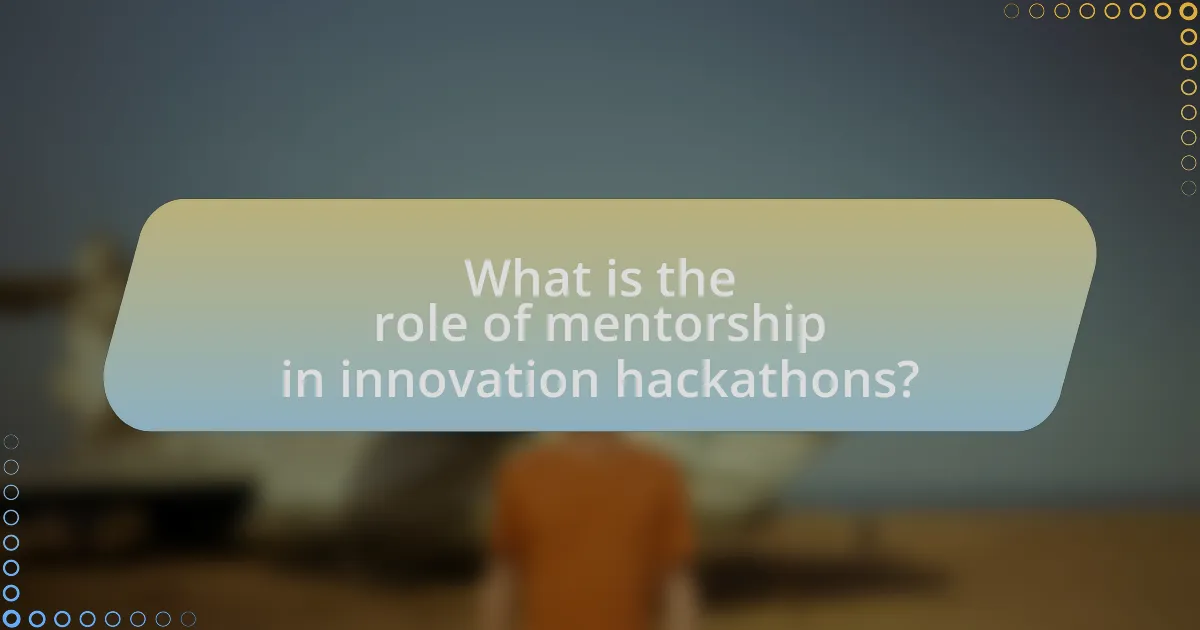
What is the role of mentorship in innovation hackathons?
Mentorship in innovation hackathons plays a crucial role in guiding participants through the complex process of ideation and development. Mentors provide expertise, feedback, and support, which enhances the quality of projects and accelerates learning. Research indicates that teams with access to mentors are more likely to succeed in achieving their goals, as mentors help navigate challenges and refine ideas. For instance, a study by the Stanford Graduate School of Business found that mentorship significantly improves team performance and innovation outcomes in competitive environments.
How does mentorship influence participant engagement in hackathons?
Mentorship significantly enhances participant engagement in hackathons by providing guidance, support, and expertise. Participants who receive mentorship are more likely to feel motivated and confident in their abilities, leading to increased collaboration and creativity. Research indicates that mentorship fosters a sense of belonging and community, which is crucial in high-pressure environments like hackathons. For instance, a study published in the Journal of Business Research found that mentorship positively correlates with participant satisfaction and overall performance in competitive settings. This evidence underscores the vital role mentorship plays in driving engagement and success during hackathons.
What specific skills do mentors provide to participants?
Mentors provide participants with critical skills such as problem-solving, communication, and technical expertise. These skills enable participants to navigate challenges effectively, articulate their ideas clearly, and apply specialized knowledge relevant to their projects. For instance, a study by the International Journal of Mentoring and Coaching in Education highlights that mentorship significantly enhances participants’ ability to innovate and collaborate, leading to improved project outcomes in hackathons.
How does mentorship enhance team dynamics during hackathons?
Mentorship enhances team dynamics during hackathons by providing guidance, fostering collaboration, and improving problem-solving skills. Mentors facilitate effective communication among team members, ensuring that diverse ideas are shared and valued. This collaborative environment encourages innovation, as teams can leverage the mentor’s expertise to navigate challenges more efficiently. Research indicates that teams with mentors report higher satisfaction and productivity levels, as mentors help clarify goals and roles, reducing confusion and conflict. For instance, a study published in the Journal of Business Research found that mentorship positively impacts team cohesion and performance, leading to more successful project outcomes in high-pressure settings like hackathons.
Why is mentorship crucial for innovation outcomes in hackathons?
Mentorship is crucial for innovation outcomes in hackathons because it provides participants with expert guidance, accelerates learning, and enhances problem-solving capabilities. Experienced mentors help teams navigate complex challenges by offering insights that can lead to more innovative solutions. Research indicates that mentorship can significantly improve project quality; for instance, a study by the National Academy of Sciences found that teams with mentors produced projects that were 30% more likely to be implemented successfully compared to those without mentorship. This demonstrates that effective mentorship not only fosters creativity but also increases the likelihood of successful innovation outcomes in hackathons.
What impact does mentorship have on the quality of ideas generated?
Mentorship significantly enhances the quality of ideas generated during innovation hackathons. Mentors provide guidance, expertise, and feedback that help participants refine their concepts, leading to more innovative and viable solutions. Research indicates that teams with access to mentors produce ideas that are not only more creative but also more feasible, as mentors often share industry insights and best practices that elevate the overall thought process. For instance, a study published in the Journal of Business Research found that mentorship positively correlates with increased creativity and idea quality in collaborative settings, demonstrating the tangible benefits of experienced guidance in fostering innovation.
How does mentorship facilitate problem-solving in hackathon settings?
Mentorship facilitates problem-solving in hackathon settings by providing participants with expert guidance and resources that enhance their ability to tackle complex challenges. Experienced mentors can offer insights into best practices, technical skills, and innovative approaches, which help teams navigate obstacles more effectively. For instance, a study by the Stanford Graduate School of Business found that mentorship significantly improves team performance by fostering collaboration and accelerating learning processes. This structured support enables participants to refine their ideas, troubleshoot issues, and ultimately develop more viable solutions within the limited timeframe of a hackathon.
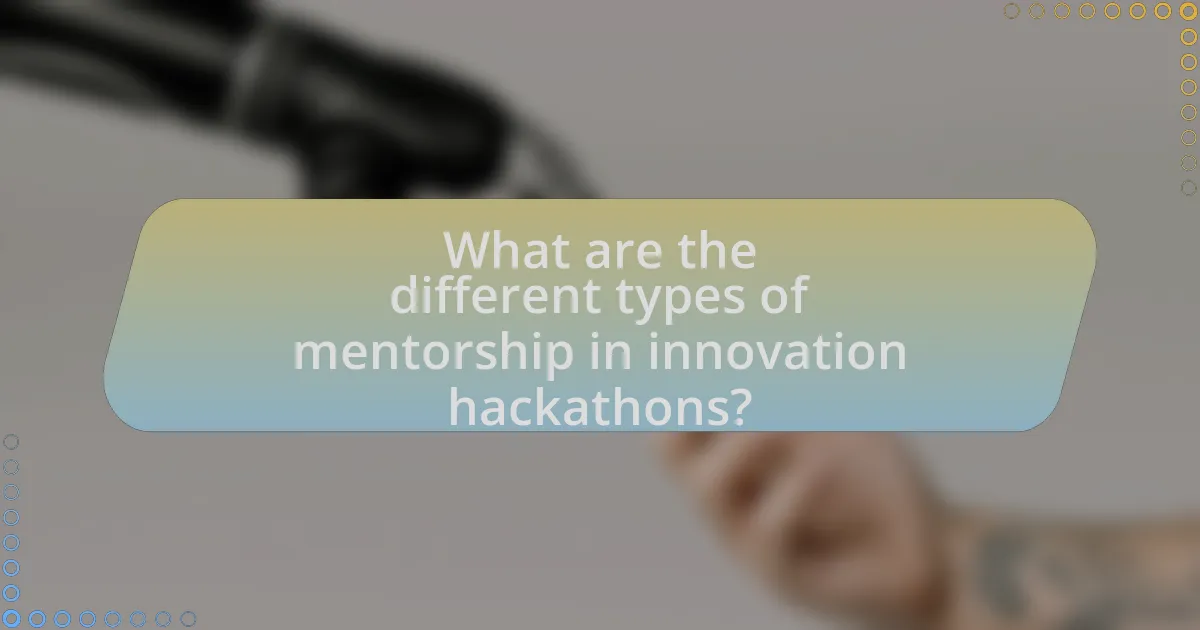
What are the different types of mentorship in innovation hackathons?
The different types of mentorship in innovation hackathons include technical mentorship, business mentorship, design mentorship, and industry-specific mentorship. Technical mentorship focuses on guiding participants in coding, software development, and technical problem-solving, ensuring that teams can effectively implement their ideas. Business mentorship provides insights into market strategies, business models, and funding opportunities, helping teams understand the commercial viability of their projects. Design mentorship emphasizes user experience and product design, assisting teams in creating user-friendly and visually appealing solutions. Industry-specific mentorship connects participants with experts in particular fields, offering tailored advice and insights relevant to the specific challenges of that industry. Each type of mentorship plays a crucial role in enhancing the overall quality and success of the projects developed during hackathons.
How do peer mentorship and expert mentorship differ in hackathons?
Peer mentorship and expert mentorship in hackathons differ primarily in the level of experience and knowledge provided. Peer mentorship involves guidance from fellow participants who may share similar skill levels and experiences, fostering collaboration and mutual learning. In contrast, expert mentorship is characterized by insights and advice from seasoned professionals with extensive industry knowledge, offering specialized skills and strategic direction. Research indicates that expert mentorship can significantly enhance project outcomes, as seen in a study by the National Academy of Engineering, which found that teams with expert mentors achieved higher innovation rates compared to those relying solely on peer support.
What advantages does peer mentorship offer to participants?
Peer mentorship offers participants enhanced learning opportunities, emotional support, and networking benefits. Participants engage in reciprocal learning, where they share knowledge and skills, leading to improved problem-solving abilities and innovation. Emotional support from peers fosters a sense of belonging and reduces stress, which is crucial in high-pressure environments like hackathons. Additionally, peer mentorship facilitates networking, allowing participants to build connections that can lead to future collaborations and career opportunities. Studies indicate that mentorship relationships can significantly boost participants’ confidence and motivation, further enhancing their overall experience and outcomes in innovation hackathons.
How can expert mentorship accelerate project development?
Expert mentorship accelerates project development by providing targeted guidance, industry insights, and strategic advice that enhance decision-making and problem-solving. Mentors leverage their experience to help teams navigate challenges more efficiently, reducing the time spent on trial and error. For instance, a study by the Kauffman Foundation found that startups with mentors are 3.5 times more likely to grow and succeed than those without. This statistic underscores the significant impact that expert mentorship can have on the speed and effectiveness of project development in innovation settings.
What role do mentors play in fostering a culture of innovation?
Mentors play a crucial role in fostering a culture of innovation by providing guidance, support, and expertise to individuals and teams. They facilitate knowledge transfer, encourage creative thinking, and help mentees navigate challenges, which enhances problem-solving capabilities. Research indicates that mentorship significantly increases the likelihood of innovative outcomes; for instance, a study by the Harvard Business Review found that 70% of mentored individuals reported improved performance and increased innovation in their projects. This evidence underscores the importance of mentors in creating an environment where new ideas can flourish and be effectively implemented.
How do mentors encourage risk-taking and creativity among participants?
Mentors encourage risk-taking and creativity among participants by fostering a supportive environment that values experimentation and open dialogue. They create a safe space where participants feel comfortable sharing unconventional ideas without fear of judgment, which is essential for innovation. For instance, mentors often share their own experiences of failure and success, demonstrating that taking risks can lead to valuable learning opportunities. Research indicates that mentorship can significantly enhance creative problem-solving skills, as mentors guide participants through brainstorming sessions and encourage them to explore diverse perspectives. This approach not only boosts participants’ confidence but also cultivates a culture of innovation, as evidenced by studies showing that teams with effective mentorship are more likely to generate original solutions during hackathons.
What strategies do mentors use to inspire innovative thinking?
Mentors inspire innovative thinking by fostering a culture of open communication and encouraging risk-taking. They create an environment where mentees feel safe to express unconventional ideas without fear of criticism. This approach is supported by research indicating that psychological safety enhances creativity and innovation (Edmondson, 1999). Additionally, mentors often employ techniques such as brainstorming sessions and collaborative problem-solving, which stimulate diverse perspectives and lead to novel solutions. By sharing their own experiences and challenges, mentors also provide real-world context that can spark new ideas, reinforcing the importance of experiential learning in the innovation process.
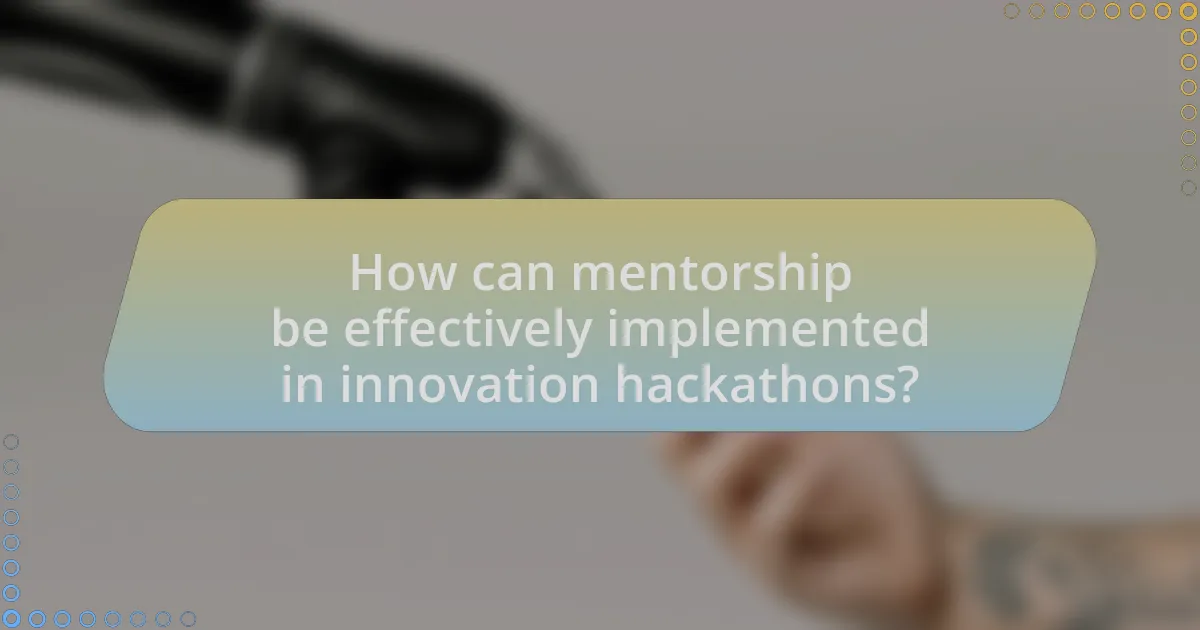
How can mentorship be effectively implemented in innovation hackathons?
Mentorship can be effectively implemented in innovation hackathons by integrating structured mentorship sessions throughout the event. Organizing regular check-ins between mentors and teams allows for real-time feedback and guidance, which enhances the development process. Research indicates that mentorship significantly improves team performance; for instance, a study published in the Journal of Business Research found that mentorship positively influences innovation outcomes by providing critical insights and support. Additionally, pairing experienced mentors with diverse teams fosters knowledge sharing and encourages creative problem-solving, ultimately leading to more innovative solutions.
What best practices should be followed for mentor selection?
Best practices for mentor selection include identifying mentors with relevant expertise, ensuring alignment with mentee goals, and evaluating interpersonal skills. Selecting mentors who possess specific knowledge related to the innovation hackathon’s focus area enhances the learning experience, as evidenced by studies showing that expertise directly correlates with effective guidance. Additionally, aligning mentor and mentee goals fosters a productive relationship, which research indicates is crucial for successful mentorship outcomes. Finally, assessing interpersonal skills ensures that mentors can communicate effectively and provide constructive feedback, which is supported by findings that highlight the importance of communication in mentorship effectiveness.
How can organizers ensure a good match between mentors and participants?
Organizers can ensure a good match between mentors and participants by implementing a structured matching process that considers the skills, experiences, and goals of both parties. This process can include detailed surveys or questionnaires that gather information about participants’ needs and mentors’ expertise, allowing for a more tailored pairing. Research indicates that effective mentor-mentee matches can significantly enhance learning outcomes and satisfaction, as seen in studies conducted by the National Mentoring Partnership, which highlight that well-matched pairs lead to improved engagement and success rates in mentorship programs.
What training or resources do mentors need to be effective?
Mentors need training in communication skills, active listening, and feedback techniques to be effective. These skills enable mentors to engage mentees effectively, fostering a supportive environment that encourages innovation. Additionally, resources such as access to industry knowledge, mentorship frameworks, and tools for goal setting enhance a mentor’s ability to guide participants in innovation hackathons. Research indicates that structured mentorship programs, which include training and resources, significantly improve the outcomes of mentorship relationships, leading to higher satisfaction and success rates among mentees.
What challenges do mentors face in hackathon environments?
Mentors in hackathon environments face several challenges, including time constraints, diverse skill levels among participants, and the need to balance guidance with allowing teams to explore their own solutions. Time constraints often limit mentors’ ability to provide in-depth support, as hackathons typically have tight schedules. Additionally, mentors encounter a wide range of skill levels among participants, which can make it difficult to tailor advice effectively. Furthermore, mentors must navigate the fine line between offering assistance and encouraging teams to develop their own ideas, which is crucial for fostering innovation. These challenges can hinder the effectiveness of mentorship during hackathons, impacting both the learning experience for participants and the overall success of the event.
How can mentors overcome time constraints during hackathons?
Mentors can overcome time constraints during hackathons by implementing structured time management strategies. These strategies include setting clear objectives for each mentoring session, prioritizing key topics, and utilizing tools for efficient communication. For instance, mentors can prepare resources in advance, such as guides or templates, to streamline discussions and focus on critical areas. Research indicates that effective time management can enhance productivity by up to 25%, allowing mentors to maximize their impact within limited timeframes. By adopting these practices, mentors can ensure they provide valuable support while navigating the fast-paced environment of hackathons.
What strategies can mentors use to manage diverse participant needs?
Mentors can manage diverse participant needs by employing individualized approaches, fostering open communication, and utilizing adaptive teaching methods. Individualized approaches involve assessing each participant’s background, skills, and learning preferences to tailor guidance effectively. Open communication encourages participants to express their needs and challenges, allowing mentors to adjust their support accordingly. Adaptive teaching methods, such as using varied instructional techniques and resources, cater to different learning styles, ensuring that all participants can engage meaningfully. Research indicates that personalized mentorship significantly enhances participant satisfaction and learning outcomes in diverse settings, highlighting the effectiveness of these strategies.
What are the key takeaways for successful mentorship in innovation hackathons?
Successful mentorship in innovation hackathons requires clear communication, active engagement, and tailored guidance. Clear communication ensures that mentors convey their insights effectively, fostering an environment where participants feel comfortable asking questions and sharing ideas. Active engagement from mentors, such as participating in brainstorming sessions and providing real-time feedback, enhances the learning experience and encourages creativity. Tailored guidance, which considers the unique strengths and weaknesses of each team, allows mentors to offer relevant advice that aligns with the specific goals of the hackathon. Research indicates that effective mentorship can significantly improve team performance and innovation outcomes, as seen in studies highlighting the correlation between mentor involvement and project success rates in competitive environments.
How can mentors measure their impact on participants’ success?
Mentors can measure their impact on participants’ success through specific metrics such as participant feedback, skill development assessments, and project outcomes. By collecting qualitative feedback from participants regarding their learning experiences and perceived growth, mentors can gauge the effectiveness of their guidance. Additionally, conducting pre- and post-assessments of skills relevant to the hackathon can provide quantitative data on improvement. Furthermore, analyzing the success of projects, including innovation quality and implementation rates, offers concrete evidence of the mentor’s influence on participants’ achievements. These methods collectively validate the mentor’s role in enhancing participant success in innovation hackathons.
What tips can mentors follow to enhance their effectiveness in hackathons?
Mentors can enhance their effectiveness in hackathons by actively engaging with participants, providing timely feedback, and facilitating collaboration. Active engagement involves being approachable and available to answer questions, which fosters a supportive environment. Timely feedback helps participants refine their ideas and improve their projects, as studies show that immediate guidance can significantly boost performance. Facilitating collaboration encourages teamwork, allowing participants to leverage diverse skills and perspectives, which is crucial in a fast-paced hackathon setting.
